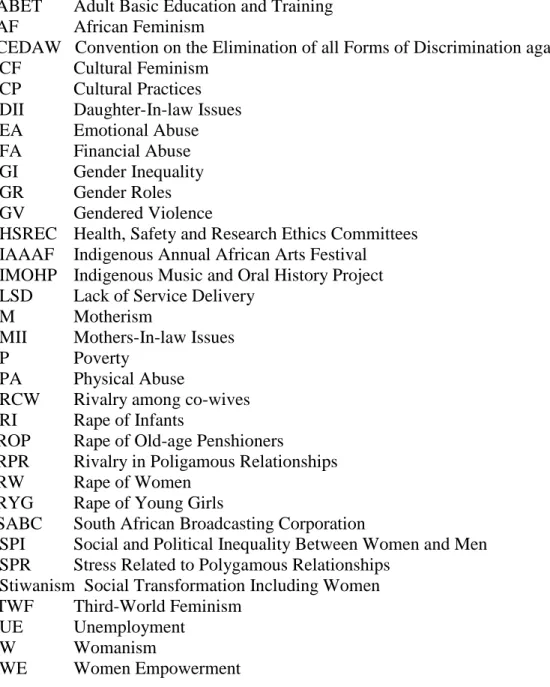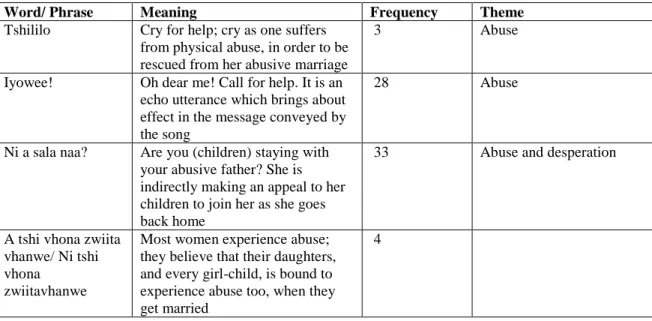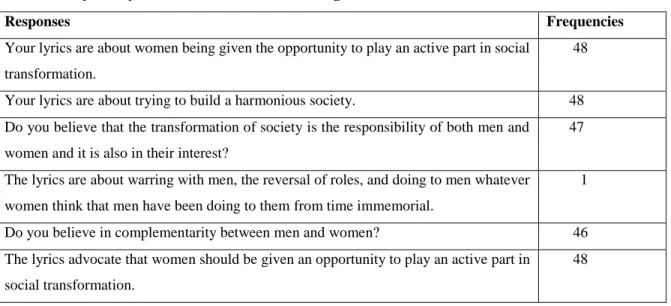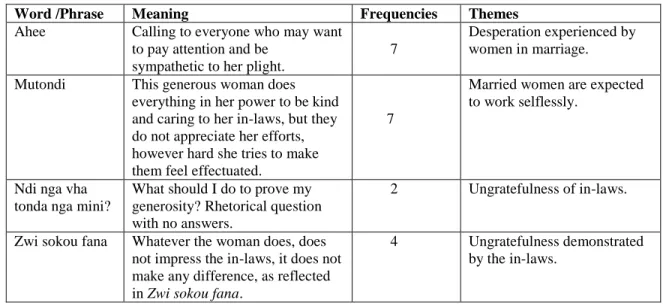It is through content analysis and discourse analysis that the linguistic perspective of the study will be exposed. Making women aware of the fact that they should not be apologetic about expressing their emotions, as it is not a weakness but a strength, will also strengthen the feminist feature of this study.

INTRODUCTION
BACKGROUND
This implies that people may not be aware that the women who perform tshigombela and paint protest songs have issues that they are outraged about. As South Africans, we may not realize that the saying wathint' abafazi, wathint'imbokodo (touch the women and you touch a boulder), has now come to represent the high degree of courage and strength of women (Mchunu, 2010) .
STATEMENT OF THE PROBLEM
The Tshivenda language, as well as indoctrination, which may be the result of immersion in Christian and Western cultural ideologies, which has resulted in audience members shying away from their Tshivenda culture. This implies that people may not be aware of the fact that these women have issues that displease them because they do not articulate their grievances, or appear to downplay their woes and when they compose tshigombela and malende for the status-quo- in, The prejudiced audience, who may not even pay attention to the lyrics, listens only to the melody and rhythm of the songs and misses the issues presented as well as the moral of the songs.
RATIONALE
The researcher in this study argues that the ideal situation for the success of a democratic country's constitution lies in the authors ensuring that it not only looks impressive on paper, but also in political rhetoric, but that it is explained and questioned for the benefit of even the most illiterate, ignorant, politically superficial and inexperienced, who shall be empowered and "liberated" by the exposition of its provisions. It is important to note that within the tshigombela and milling texts are hidden very intellectually topical issues that need to be exposed.
PURPOSE OF THE STUDY
The study will also examine the significance of indigenous protest texts tshigombela and malenda in addressing women's struggle against inequality and gender-based violence. The second purpose of the study is to investigate whether other forms of feminism such as cultural feminism, womanism, motherhood, stivanianism and third world feminism can be recognized in indigenous texts, particularly Tshigombela and Malende.
OBJECTIVES OF THE STUDY
This study also aims to highlight women's issues alluded to in the tshigombela and malende texts. This means that the study does not only examine protest texts, including those that express hidden protests, but also sensitizes the reader to the importance of the role played by rural women in communicating and articulating women's issues.
RESEARCH QUESTIONS
What is the significance of performing the protest texts of tshigombela and malenda among the communities residing in Vhembe District Municipality.
DEFINITIONS OF TERMS
Protest music (war songs, political songs or liberation songs) is also one of the critical factors in dealing with the current socio-economic situation in South Africa and the challenges of the day. Third World feminism emphasizes the satisfaction of basic material needs as an urgent issue in the context of the unfavorable international economic order (Saunders, 2002:6).
METHODOLOGY
Womanism affirms black women's historical connection to men through love, and through a shared struggle for survival and a productive quality of life. The main concerns of Womanism are survival, community building and maintenance, and the purpose of community building is to establish a positive quality of life, that is to say economically, spiritually, educationally, for black women, men and children (Williams, 1987) .
DELINEATION OF CHAPTERS
The first chapter provided a perspective to this study, which is concerned with the significance of the performance of tshigombela and malende protest music, and current arguments relating to women's issues. The background of the study, statement of the problem, rationale, purpose of the study, objectives and research questions were presented in this chapter.
INTRODUCTION
FROM SLAVE SONGS TO NEGRO SPIRITUALS
- Slave songs as work songs
- Slave Songs for Communicating Information
- Slave songs as Sorrow Songs
- Slave Songs Adapted for the Civil Rights Movement
In research conducted by Castellini (2013: 5), the slave songs are described as a 'perfect example of linguistically hidden transcriptions', and that. Slave songs were often performed as interactive songs, using the call and response form.
PROTEST SONGS AND POLITICAL STRUGGLES
- Protest Music and Politics
- Protest Songs against the Land Act
- Protest Songs against the South African Struggle for Freedom
- Struggle Songs about Socio-Political Issues
- Protest Music and the Use of Word Play
- Indirect Reference to Politically Sensitive Issues
- Protest Songs to Express Defiance
- Protest Songs as a Strategy Employed to Accelerate Change
- Protest Music and Non-Verbal Expressive Conventions
- Protest Songs against Corrupt Leadership
- Protest Songs against Forced Removals
- Protest Songs to Enforce Normal Behaviour
- Protest Songs to Blow off Steam
- Political Protest Music and Linguistics Prowess
- The Power of Music, and Politics
- Struggle Songs in Post-Apartheid South Africa
- Performance of Umshini Wami and Power Relations
While performing political songs is a liberating act, it is fascinating, both in the pleasure of singing and in the ideology of the lyrics being sung. It is the power of freedom songs that strengthened the resolve of the oppressed majority of South Africa (Kasril, 1995).
WOMEN OF SONG
- Cryptic Lyrics
- Protest Songs Advise Course of Action
- Mournful Tones in Protest Songs
- Protest Artists Have a ‘Third Eye’
- Proverbs in Protest Lyrics Reflect Reality
- Protest Music and Linguistic Prowess
She wrote and performed Hamba Notsokolo,20 one of the biggest South African hits of the 1950s and still very popular among her songs. Although melancholic, they both still maintain the accusatory, confrontational tone of some of the protest songs (Allen 2003: 237).
RELEVANCE OF INDIGENOUS WOMEN’S PROTEST MUSIC IN THE NEW
Recycling of Old Liberation Songs
The biggest challenges facing South Africa after 1994 lie in the government's economic situation, its inability to achieve sustainable development and fight poverty and inequality (Maloka, 2014). The Voëlvry Music Movement in South Africa: Anatomy of African Anti-Apartheid Social Protest in the Eighties.
SIGNIFICANCE OF PROTEST SONGS AMONG VHAVENDA WOMEN
- Purpose of Tshigombela and Malende
- Relevance of Indigenous Protest Music
- Description of Tshigombela
- Description of Malende
- The Role of Tshigombela and Malende in Society
- Tshigombela and Malende are a Means of Communicating with Rulers
- Protest Songs as Expressions of Criticism against Royal Leadership
- Protest Music against Women Abuse
- Protest Lyrics which may Appear to be Civil
- Protest Songs about Forced Removals
- Protest Music against Abuse of Culture
- Protest Songs and Polygamous Relationships
- Protest Music and Poetic Licence
Ironically, the protest texts coined will be replaced by laudatory texts coined in praise of the magnanimity of the same royal leadership (Mutshotsho, 2013; Netshirembe, 2013). Vail and White noted that "power can be openly criticized for the convention of form".
INTRODUCTION
Poetic license is sometimes euphemism, used to indicate the distortion of facts, change of the conventions of grammar or language, or even rewording of pre-existing text made by an artist to improve a text (Toplin, 2002 ). It can also refer to the ability of an artist to apply minor distortions, such as a poet ignoring some of the minor requirements of grammar for poetic effect (Toplin, 2002).
SOCIOLINGUISTICS
- Divergent Perspectives on Music
- Indigenous African Music
- Linguistic Taboos and Euphemism
- Code-switching
- Linguistic Perspective - Expressive Conventions in Music
- Repetition
- Sarcasm
- Name-giving
- Echoeing
- Onomotopoeic Effect
- Discourse
- Discourse Analysis (DA)
- Critical Discourse Analysis (CDA)
- Semiotics as a Linguistic Perspective of Protest Lyrics
- Feminist research
According to Mutshotsho (2013), repetition is used to convey the message strongly, but also to emphasize the core or the moral of the song. Moreover, music is regarded as a 'reflection of the cultural and political environment' from which it emerges (Adams and Fuller, 2006: 938).
CONCLUSION
Focus groups are a contextual method that does not focus on the individual without a social context or in isolation from interactions with others. Montell (1999:54) agrees that focus group interviews "facilitate such connections (of collective identities and solidarities) because they can go beyond uncovering pre-existing meanings produced by already constituted subjectivities".
INTRODUCTION
RESEARCH METHODOLOGY AND DESIGN
The study used a triangulation of several research methods to ensure that the research objectives and questions were met. The study used quantitative data analysis strategies, namely, content analysis, Discourse Analysis (DA) of interviews and focus group discussions, including tshigombela and malende texts.
SAMPLING
Based on an extensive literature review, the research opted for a combination of mainly complementary qualitative data collection techniques, namely participant observation, focus group interviews, as well as what scholars such as Bartky (1995) and Hesse-Biber call feminist interviews. Due to the close relationship between DA and CDA, CDA will not be used as a data processing strategy to avoid repetition of the research results.
DATA COLLECTION TOOLS
- Data Collection Procedures
- Sampling
- Research Setting and Data Collection
- Data Analysis
In the study, recorded data in the form of lyrics, interviews and focus group discussions were captured in Luvenda (Venda language) to ensure reliability and integrity of the research findings. This study made use of Discourse Analysis of the women's responses during interviews, focus group discussions, as well as tshigombela and malende lyrics.
CONCLUSION
INTRODUCTION
Quantitative data analysis strategies such as content analysis of interviews, focus group discussions and tshigombela and malende texts were used. A combination of these methods enabled the triangulation of individual participants' different perspectives during participant observation, focus group interviews and interviews.
DEMOGRAPHIC DATA OF THE PARTICIPANTS
Although there is limited documented data on the tshigombela and malende genres, an extensive review of the literature on protest texts of other genres was undertaken. All three have participated in the annual Phalaphala fm tshigombela and malende competitions, the annual University of Venda Heritage celebrations as well as cultural celebrations in their respective villages.
PRESENTATION OF DATA AND DATA ANALYSIS
Participant Observation
This may be due to the fact that the participants were tense or scared, as they were not familiar with the research process. It is important to understand that, before the performance, the intonators and backing singers talked about different ways of improvising on a piece that the participants already know.
Interviews with group leaders
One of the ladies in the group takes notes of their lyrics in a notebook and as they change the lyrics, she records them. She is the one who composed many of the lyrics of the songs performed by her group.
CONTENT ANALYSIS OF FOCUS GROUP INTERVIEWS
Due to the fact that the participants do not know the English language, the questions were asked in Tshivenda (See APPENDIX X, which is in English and APPENDIX XI for the Tshivenda version). The focus group discussion responses in Tables 2-9 suggest that participants do not accept Western forms of feminism.

DISCUSSION
- Views on Patriachy
- Vhavenda Women’s Stoicism
- Coexistence between Women and Men
- Communalism against Individualism
- Inclusion of Both Women and Men in Developmental Issues
- Motherism as a Viable Option for Vhavenda Women
For the participants in this study, like other Vhavenda people in other communities, women's stoic disposition does not allow them to succumb to the harsh conditions they find themselves in. Therefore, the participants in this study, especially those who are married, are required to the institution of the family and certainly do not want to do without their husbands, despite unfavorable problems referred to in the lyrics of the songs they perform, which may affect their relationship.
DATA ANALYSIS OF SONGS
This suggests that her husband is not only abusing her physically but also verbally. Vhamusanda Vha Ri Vusa Nga Matsheloni – The boss wakes us up early in the morning.

LINGUISTIC DEVICES
The tone of these lyrics is a married woman protesting against the abusive treatment meted out to her by her husband and mother-in-law. The repetition of these lyrics has a melancholic effect on the audience, leading the audience to sympathize with the inner's plight.
CONSCIOUSNESS-RAISING
LIMITATIONS
CONCLUSION
The lyrics of protest songs by tshigombela and malenda artists were also analyzed. The purpose of this analysis was to ensure that the aims, objectives and research questions of the study were met.
INTRODUCTION
CONCLUSIONS OF THE STUDY
It was used to reinforce the innuendo, the implications of the lyrics, as well as to acknowledge the meaning of the message that is cunningly expressed in the performances. Not only does inners use ambiguous, which can be gauged by those whose ear is able to 'perceive' the thought process involved in the artists.
RECOMMENDATIONS
Recommendations of the study
Therefore, song lyrics should be composed to educate communities about these issues, thus motivating communities to report these crimes. The achievements of Tshigombela and painters should be used to educate and unite men and women, improve their relationships and unite communities.
CONCLUSION
In the past girls were raised to be caring, considerate and have values, and boys were not. An unpublished thesis submitted in partial fulfillment of the requirements for graduation by research in international studies in the undergraduate colleges of The Ohio State University.






